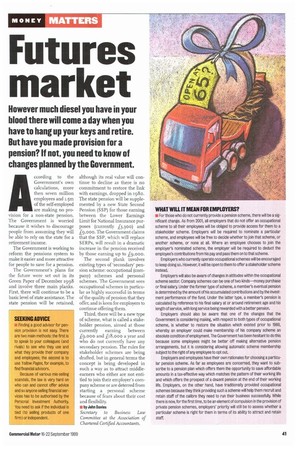Futures market
Page 45

If you've noticed an error in this article please click here to report it so we can fix it.
However much diesel you have in your blood there will come a day when you have to hang up your keys and retire. But have you made provision for a pension? If not, you need to know of changes planned by the Government.
According to the Government's own calculations, more then seven million employees and 1.5m of the self-employed are making no provision for a non-state pension. The Government is worried because it wishes to discourage people from assuming they will be able to rely on the state for a retirement income.
The Government is working to reform the pensions system to make it easier and more attractive for people to save for a pension.
The Government's plans for the future were set out in its Green Paper of December 1998 and involve three main planks. First, there will continue to be a basic level of state assistance. The state pension will be retained, although its real value will continue to decline as there is no commitment to restore the link with earnings, dropped in 1980. The state pension will be supplemented by a new State Second Pension (SSP) for those earning between the Lower Earnings Limit for National Insurance purposes (currently £3,300) and £9,000. The Government claims that the SSP, which will replace SERPs, will result in a dramatic increase in the pension received by those earning up to £9,000.
The second plank involves existing types of 'secondary' pension scheme: occupational (company) schemes and personal schemes. The Government sees occupational schemes in particular as highly successful in terms of the quality of pension that they offer, and is keen for employers to continue offering them.
Third, there will be a new type of scheme, what is called a stakeholder pension, aimed at those currently earning between £9,000 and L18,000 a year and who do not currently have any secondary pension. The rules for stakeholder schemes are being drafted, but in general terms the concept is being developed in such a way as to attract middleearners who either are not entitled to join their employer's company scheme or are deterred from starting a personal scheme because of fears about their cost and flexibility.
• by John Davies Secretary to Business Law Committee at the Association of Chartered Certified Accountants.










































































































